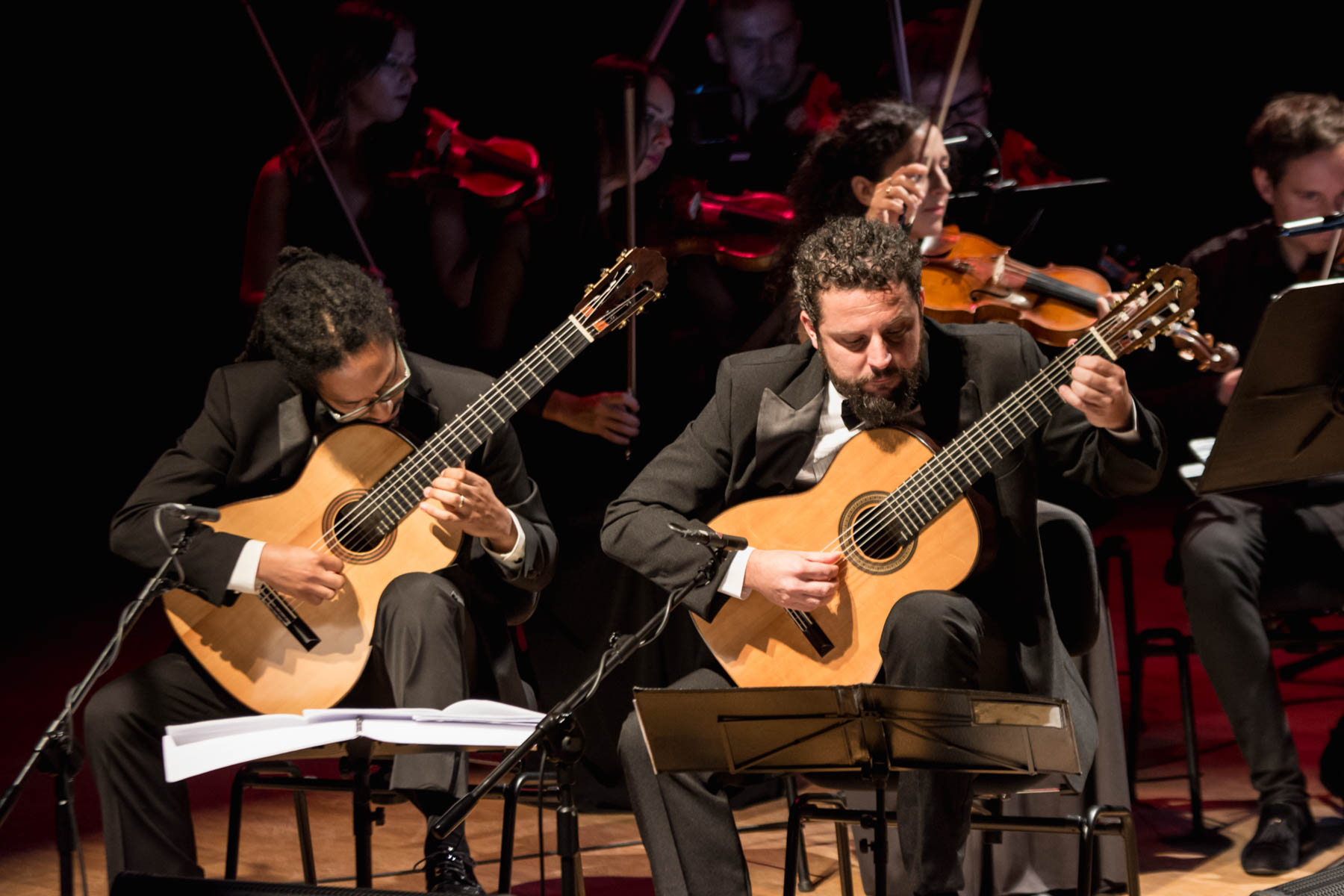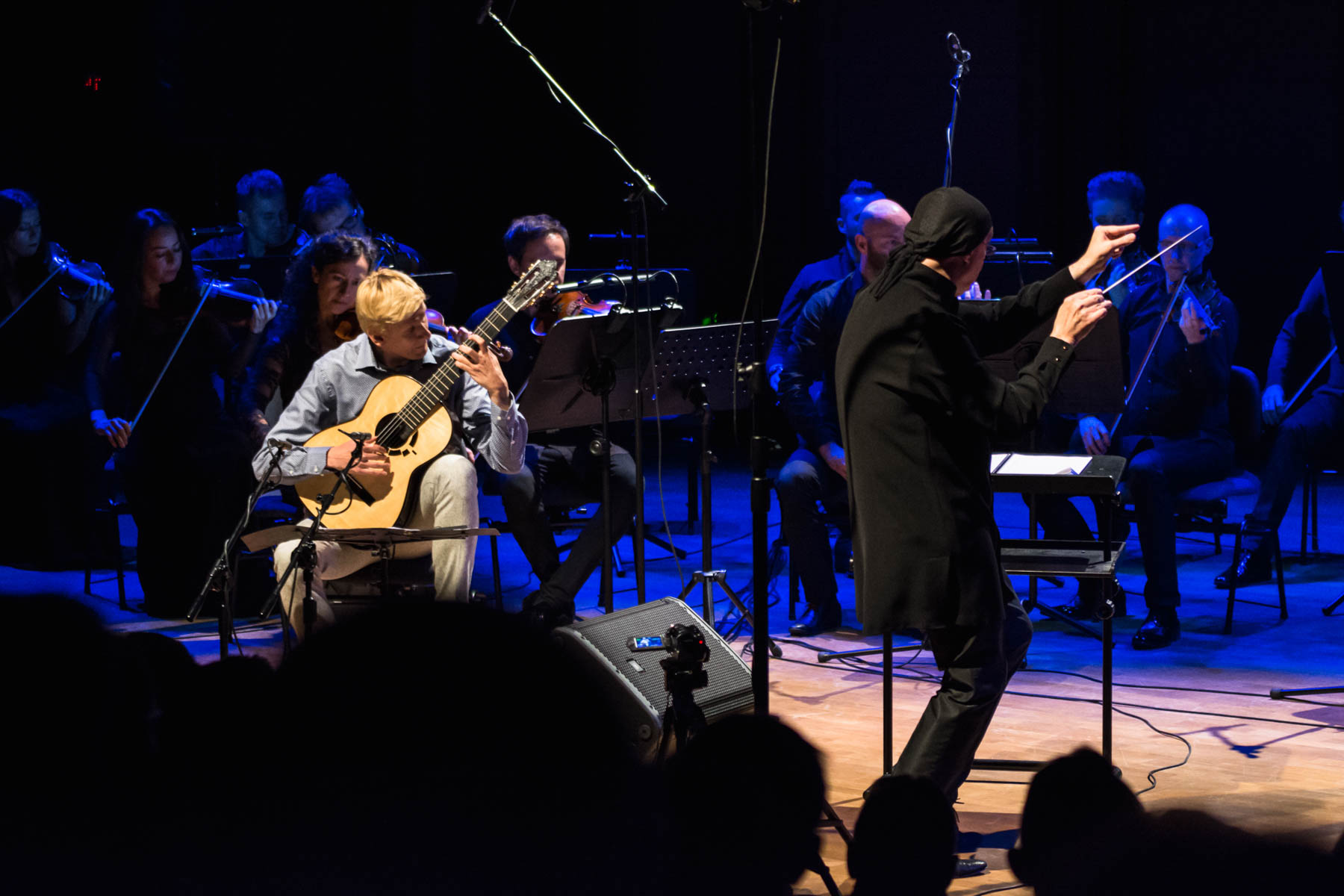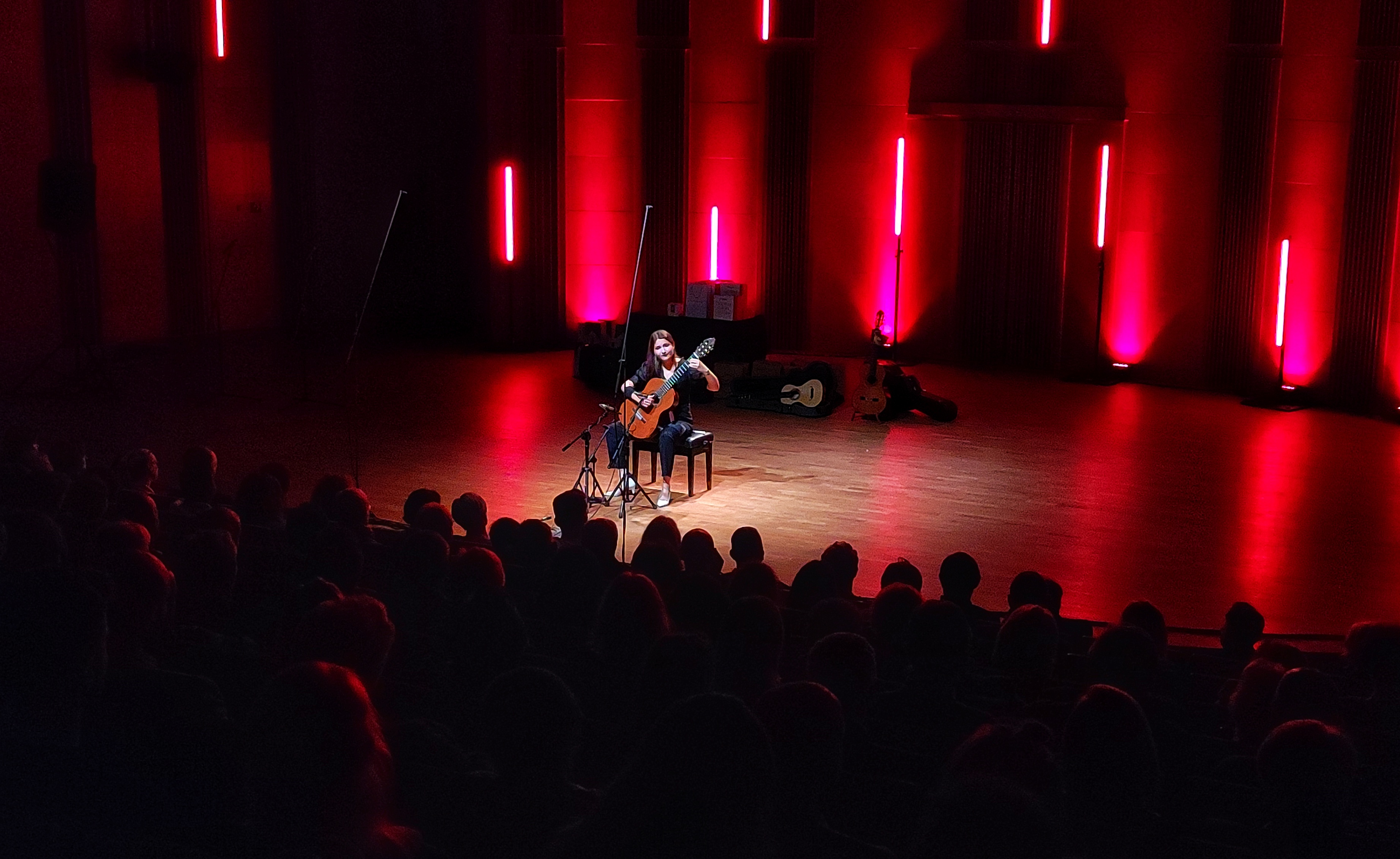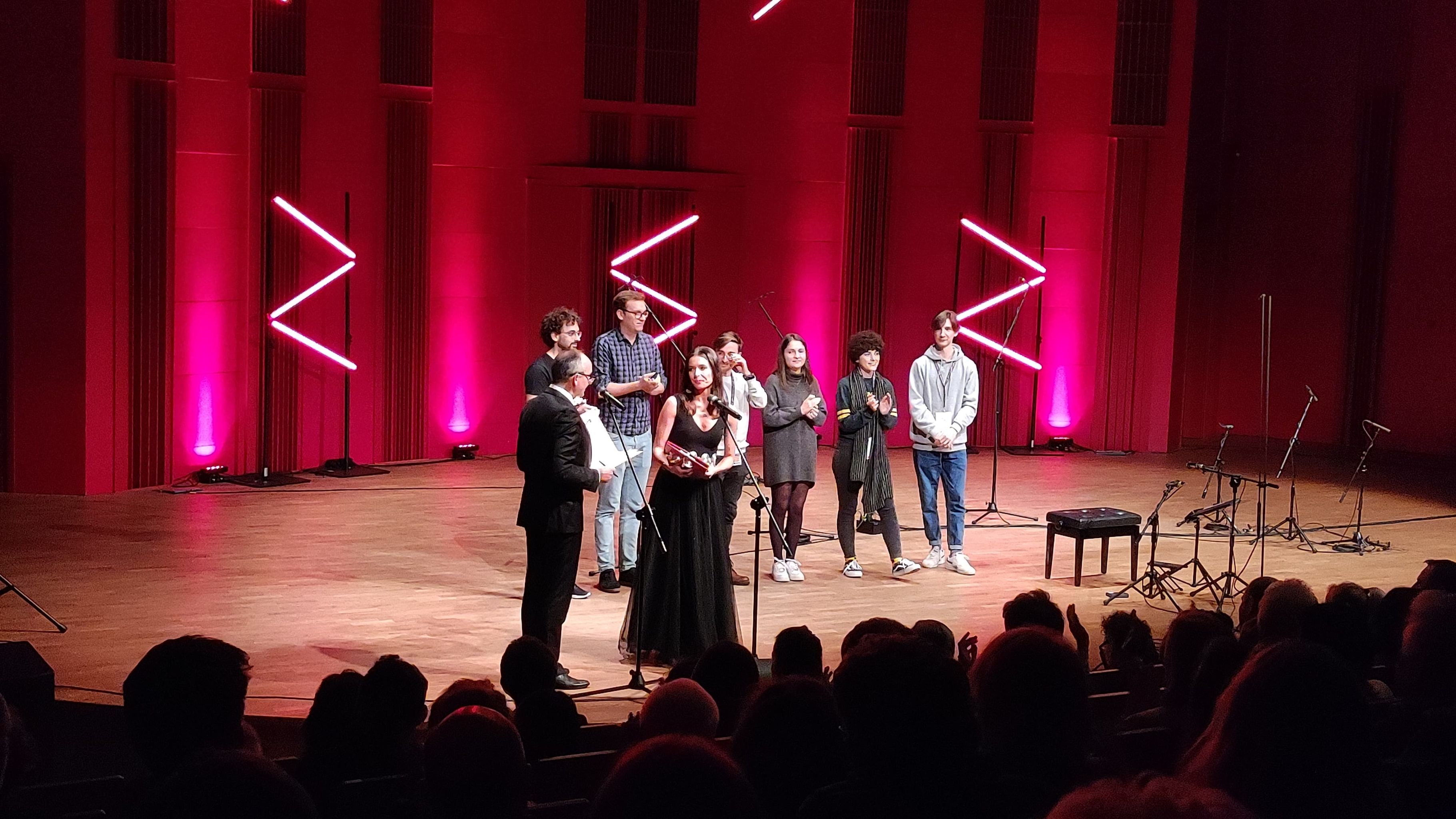
The guitar is the key to the world of music
“As a musician, I firmly believe that attracting an audience to music and high culture via the guitar is a good idea. The guitar is a universal key to the world of music, it is popular, associated with various genres, and it captures attention. With the guitar you can show how rich the world of music is. It functions in many different varieties and styles”, says Marek Nosal, the artistic director of the 18th Silesian Guitar Autumn.
The 18th edition of the Silesian Guitar Autumn festival will be held in October, exceptionally four years after the previous edition. Do you miss the hustle and bustle connected with the organisation of this event?
I don’t, because in my mind I have been planning this year’s festival since the previous edition, that is, since 2018. By the late spring of 2020, we had been preparing the event with the hope that it would be possible to hold it as scheduled. Then we intended to postpone the festival to 2021, so we kept the spirit of the organisation and we fought for that event. In the end, we had to postpone the festival by yet another year.
This will be the third edition of the competition and festival which you organise as the artistic director. What did you learn during that time- as a musician, and as a human being?
That’s an interesting question. Only half-joking – I learnt to think and to do more things at the same time than I had ever been able to do before. But more seriously – as a human being, I think that I started to appreciate the role of cooperation between people to a greater extent – the search for agreement and opportunities for conversation, because in this way one usually achieves a lot.
I have seen that our festival is very recognizable all over the world. This is manifested in the fact that I get a lot of various offers of help. That is very touching. In turn, as a musician, I confirmed my belief that attracting an audience to music and high culture via the guitar is a good idea. I often say that the guitar is a universal key to the world of music, it is popular, associated with various genres, and it captures attention. The guitar allows us to show how rich the world of music is, and it plays such a role at our festival, because it functions in many different varieties and styles.
What is the significance of the Silesian Guitar Autumn for the participants of the competition, the stars giving concerts, and for the city of Tychy?
The competition is of particular importance for the participants, as it has wide recognition in Europe. It is prestigious due to its high level and a long tradition, which is documented, for example, by the list of winners of successive editions of the competition. These guitarists are now well known and perform concerts. We have an excellent orchestra, which, in the final, plays together with the best participants of the previous rounds. This is a rarity in the festival world, and it also acts as a magnet for the participants. There are also prizes, both financial and in-kind, as well as – which is very important – the concerts. We always make sure that the winner, who is also an ambassador of our festival, can play at similar guitar festivals around the world, and in our concert halls.
The rank of the festival also attracts artists with a well-established position. Among other reasons, this is because it has such a long history and was so ``grand`` from the beginning. I mean the number of concerts, the duration, and the participation of multiple orchestras. It's been 36 years! Such a long tradition makes everyone want to play here. The performance at the Silesian Guitar Autumn is often included in their biographical notes as proof of their professional position and prestige.
Tychy, in my opinion, gains in terms of its image and promotion, as it is the case in each city where important cultural events are held. One is ennobled by culture, as it is associated with something of timeless value, but also, very practically, creates a favourable environment. It’s associated with a good place to live. Foreigners associate the Silesian Guitar Autumn as the “Tychy Guitar Festival”. The address of our website – guitar.tychy.pl – is also unambiguous.
What can an average listener of popular music expect when visiting the Silesian Guitar Autumn?
I suspect that this question conveys a worry that classical music is like a hedgehog that might prick. To those who are afraid, I would say this: “Come to the festival!” I know how the audience reacts. When a hesitant person hears the music, their reaction is sure to be positive.
The classical guitar was popular among a wide mass audience from the beginning . That hasn’t changed to this day. The repertoire of a guitar recital is usually very broad. You can find both classical and contemporary music, inspired by folk, ethno, jazz or rock music. Guitar music is very often influenced by mass culture, as opposed to, for example, the violin or the piano. Regardless of the repertoire, a very intimate aura is created during a guitar recital. As a result, it is easy for a listener to establish an emotional personal connection with the artist. And this is just one of the faces of the guitar presented at the festival. Each evening concert consists of two parts, showing different faces of this instrument- the guitar solo, with orchestra, or in a chamber ensemble; the classical or flamenco guitar. Coming to the festival, you can expect only good things!
What comes to mind when thinking about music competitions is the Chopin Competition. To what extent is it an inspiration to you?
I dream that the Silesian Guitar Autumn will grow to such a rank in terms of its significance and reception in the public consciousness. Of course, you have to realistically assess the proportions of the position of Chopin and the classical guitar in the world of music. In addition, our competition is a part of the festival, so the nature and form of both events are different. As I said before, the competition held within the confines of our festival is characterised by high level and reputation, which is why I sometimes hear that the Silesian Guitar Autumn is a kind of Chopin Competition in the guitar world. This is undoubtedly very pleasant.
There was an idea, inspired by the Chopin competition, realised during the last edition, that six guitarists would play in the final, which was more than it had been until then. The orchestra was probably a little scared at first because, of course, it meant more effort, more rehearsals, the concert lasted longer, but the audience was delighted.
What will this year’s edition of the Silesian Guitar Autumn look like? Can we expect concerts of recognized artists in addition to the Jan Edmund Jurkowski Memorial Competition?
In this edition, the first festival events will be held in Katowice, which is becoming an increasingly important music centre, and we have partner institutions there. That’s where we’ll inaugurate the festival and then move it to Tychy. The formula itself will not be very different from previous editions. The competition will end with the final, in which the participants will perform with the AUKSO Chamber Orchestra of the City of Tychy. The stars will also perform solo, in ensembles, and with orchestras. This year there will be five of them performing with us, namely, Polish National Radio Symphony Orchestra, Archetti Chamber Orchestra, Radom Chamber Orchestra, the Silesian Chamber Orchestra and, of course, AUKSO Chamber Orchestra of the City of Tychy. This is a return to the tradition of the first festivals, when the presence of four different orchestras stunned guests, especially foreign ones.
The repertoire of these concerts will be very diverse. Adam Del Monte – a versatile guitarist and composer – who will perform a flamenco concert with NOSPR (Polish National Radio Symphony Orchestra) . Kupiński Duo with Archetti Chamber Orchestra will play Concertomaggio by Roland Dyens, who was a much-loved guest and friend of the festival but who passed away several years ago. Jérémy Jouve, the winner of the competition a number of years ago, will play a recently premiered concert by Thierry Escaich, which refers, among other things, to electronic and club music. One of the stars of the festival will also be Mak Grgic, who will perform “Balkan Suite of Dances”. He is a classic guitarist, recently nominated for The GRAMMY award, not afraid of any challenges, perfectly fitting into the idea of combining styles. We will also recall the work of Professor Aleksander Lasoń, whose 70th birthday was celebrated with a concert last year, during Auksodrone – another festival in Tychy. I will perform a new version of his Sinfonia concertante on a non-classical guitar, let’s call it a “hybrid”. I’m a little afraid of it myself, because given the habits of our environment, it can be treated as stirring the pot. However, together with the composer, we are convinced that this is a good idea. I think that when this musical piece is played according to the original idea of the creator, we will win the listeners over as well. This will be another valuable contribution of the festival to Polish music literature. Radom Chamber Orchestra with Jakub Kościuszko will perform a programme in memoriam of the recently deceased guitarist and composer Harvey Hope. In September, at its headquarters, the Silesian Philharmonic, the Silesian Chamber Orchestra will play a concert to herald the festival.
The guests of the festival will also be able to see performances of the stars – both solo or in chamber ensembles. This includes Yamandu Costa, a Brazilian guitarist with incredible virtuoso and improvisational skills, the winner of the Latin Grammy award, who played with many outstanding personalities of the world of music. He plays an unusual 7-string guitar, and his style is a mix of Latin American, jazz and classical music. In the final concert, a programme combining early, classical and flamenco music, will be performed by Euskal Barrokenensemble led by Enrike Solinis – an extremely versatile artist, who collaborates, among others, with Jordi Savall. The stars of symphonic concerts – Adam Del Monte and Mak Grgic – will also perform together as Duo Deloro, and it will be another fusion of the world of the classical and flamenco guitar. There will also be recitals by the winners of prestigious guitar competitions, for example Chiawei Lin, the winner of the previous Silesian Guitar Autumn. It is difficult to list all the names here, and it is worth adding that many accompanying events will be open for those interested: master classes, lectures, exhibitions.
You have been on the jury of various guitar competitions on numerous occasions. Please tell me how one can spot an artist who might become outstanding. Who has that special something?
There are at least a few traits that characterise such an artist, for example, the technique, that is, skills, as well as stage presence, which means that the internal tension during the performance energises that person, allowing their skills to show in full splendour. For me, however, the most important thing is what I would call artistic imagination, which allows the artist to read and convey the musical piece in a personal and original way. When such a performer is playing, we have an impression that he speaks his own language and we can even discover a famous piece in a new light. This is the phenomenon of great music – its potential is unlimited, everyone is able to rediscover it and show its different face.
The whole festival is a significant event, attended by the international community. Meanwhile, all this is happening in Tychy, which is not, after all, a metropolis. What kind of Tychy and what kind of Poland do you show to people who come here from all over the world?
Such festivals are often held outside capital cities, thanks to which the city gains recognition and it is associated with something very valuable, which we talked about earlier. During the festival we show Poland and Poles in the best possible light. The atmosphere at the festival is extremely intimate. It is created by the employees of the Municipal Culture Centre in Tychy, volunteers who help with the festival, and everyone who works with us. Artists from all over the world very quickly recognise such qualities as hospitality and empathy, which makes this festival leave indelible memories for them. They appreciate not only our hospitality and cordiality, but also professionalism and very good organisation of the festival – this opinion is already common, and is our best business card. What is equally important, we also present a very high level of Polish musicians – guitarists, conductors, orchestras, which is the best testimony to the quality of our education and culture.
Finally: you also participated in the Silesian Guitar Autumn as a participant of the competition. It was in the 1990 edition. Do you remember that time and the emotions that accompanied you?
I will say more, two years earlier I had also taken part in the competition, still as a secondary school student. The Silesian Guitar Autumn has been in my life since its beginning. I remember the first edition in 1986. I slept at a friend’s house in Tychy, and every day I rushed to listen to competition performances and concerts. I had already been playing the guitar for a few years at that time, but it was amazing to listen to so many splendid musicians from morning till night for the whole week. Two years later I took part in the competition, and in 1990 I won the recognition award. I remember that the competition performances were accompanied by strong emotions, certainly the most powerful ones were associated with the final performance with the orchestra. The fact that I could publically play the most famous guitar concert Concierto de Aranjuez by Joaquín Rodrigo, was an important experience for me, a dream come true.
Later, I played at the Silesian Guitar Autumn for several times, but as an invited guest. For the first time in 1992, when I had the honour to take part in the premiere of the concert for guitar and orchestra by Edward Bogusławski with the Silesian Philharmonic Orchestra and the Korean-American conductor Shinnik Hahm. Working on a piece that the composer creates literally before our very eyes, and the responsibility for how it will first sound in front of an audience – this had a major impact on my further path.
Thank you for your time.





